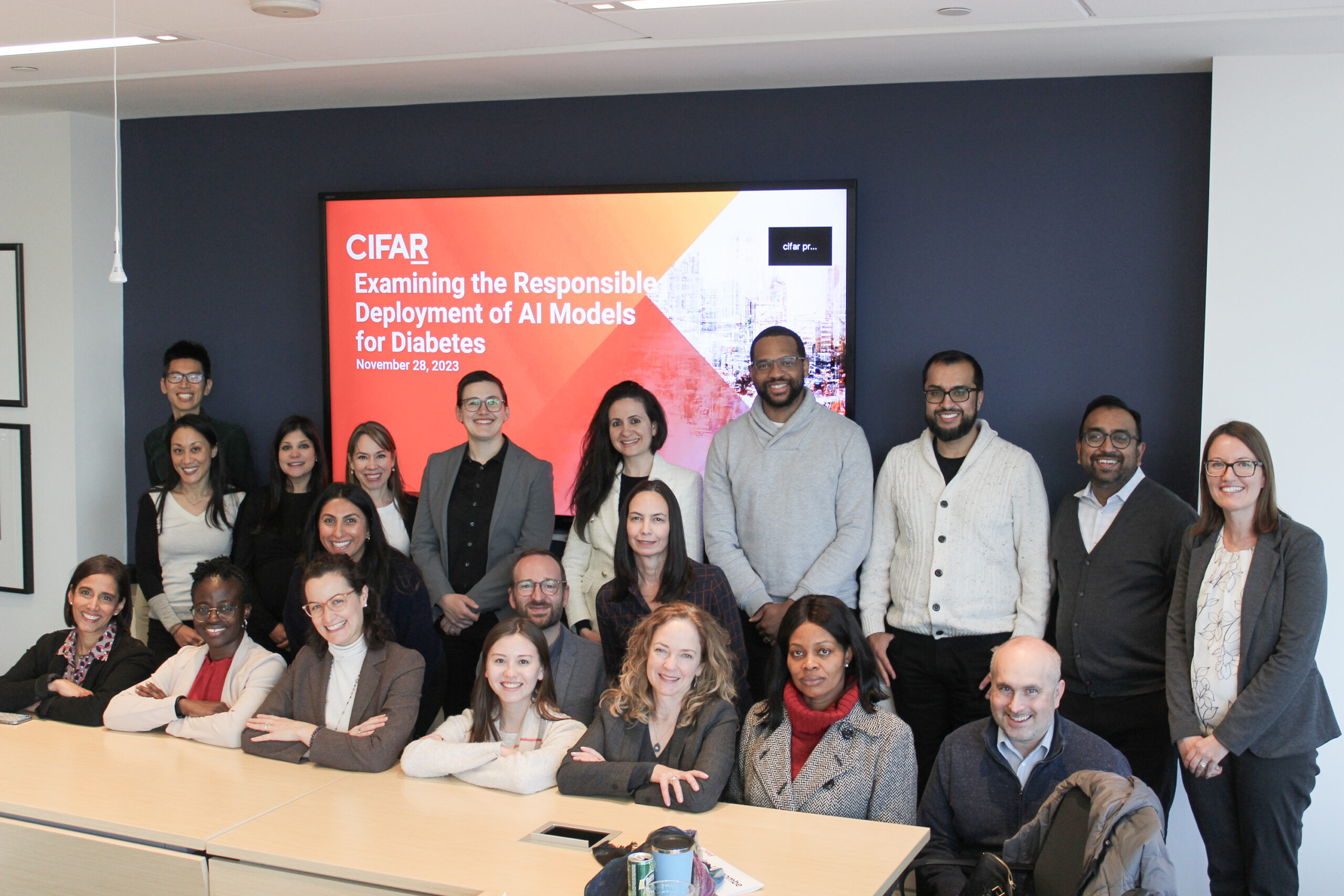By: Justine Brooks
13 Mar, 2024

In July 2023, CIFAR announced the launch of two new AI for Health Solution Networks, each with the goal of developing a targeted AI solution that will improve the health and health systems of Canadians.
The two CIFAR Solution Networks recently held their kick-off meetings, seeking advice and expertise from diverse partners to inform their next steps.
Based in Montréal, Integrated AI for Health Imaging is working in interdisciplinary teams to find responsible ways to broadly implement assistive technology for doctors to aid them in gathering a better understanding of medical exam results.
Based in Ontario’s Peel Region, AI for Diabetes Prediction & Prevention is developing a framework for the deployment of machine learning models that can predict diabetes risk with input from on-the-ground clinicians and service delivery agencies, as well as patient representatives.
Said Gagan Gill, Program Manager of the AI & Society portfolio of the Pan-Canadian AI Strategy at CIFAR: “These CIFAR Solution Networks bring strong clinical and technological expertise together with an array of interdisciplinary excellence, from ethics and policy-making, to patient engagement, privacy and governance. This holistic approach is very much needed to effectively deploy AI and machine learning in healthcare, and we’re excited to see what’s ahead for these ground-breaking teams in advancing the use of AI for better health delivery and improved health for Canadians.”

Every year, billions of diagnostic exams are conducted in the Canadian healthcare system and yet there is no wide-ranging platform that connects across systems to assist healthcare workers in interpreting exam results.
That’s about to change, thanks to work from the Integrated AI for Health Imaging CIFAR Solution Network. The interdisciplinary team is working to create a custom software, called “PACS AI” that will safely combine AI with existing Pictures Archiving Communication System (PACS) technology, which is used in health systems across Canada to digitally store and transport medical images and reports.
The work will enable medical providers and researchers to integrate their work using AI across different data types (such as x-rays and echocardiograms) and in different health care systems and facilities. It will also provide AI fairness metrics to help clinicians better understand how reliable the findings are in different demographics, supporting physician decision-making as they care for patients from diverse backgrounds.
The pilot project is already being deployed in health centers, with built-in guardrails to ensure fairness, patient privacy and data security. For transparency, PACS AI will come with a “model fact sheet” with information about the models in use.
Over the next three years, the Solution Network members will expand PACS AI into more hospitals, training ‘champion physicians’ to use and administer the platform in each location. Their next meeting will also focus on steps to deployment and sustainability, and what can be learned from others who have taken AI models from academia to the healthcare system.
“This is an opportunity to redefine the status quo of AI models in healthcare,” said Integrated AI for Health Imaging co-director Robert Avram. “This project will demonstrate the immense possibilities that AI can present in improving healthcare delivery and patient outcomes.”
Co-director Samuel Kadoury added “AI will have an impact on almost every industry and healthcare is no different. This project is a commitment to not only improving the Canadian healthcare system but ensuring that AI is integrated responsibly.”
Supporting this project is IVADO, an interdisciplinary consortium for research, training, knowledge transfer and mobilization in artificial intelligence, based at Université de Montréal and supported by 4 university partners (Polytechnique Montréal, HEC Montréal, Université Laval, and McGill University). IVADO has partnered with CIFAR to fund the Integrated AI for Health Imaging Solution Network over their three year term.
Says Barbara Decelle, Health Research Advisor at IVADO, “We are pleased to partner with CIFAR to deliver this Solution Network and further our commitment to advancing responsible AI in Canada. This exciting new project will address the challenges of safe interoperability of data, a chronic stumbling block to being able to maximize the opportunities of AI in healthcare. This is an important step in strengthening Canadian leadership in AI development and deployment in healthcare settings.”

Diabetes is expected to affect over 14 million Canadians by 2030. Carrying a major cost to the healthcare system and imbalanced outcomes for some populations, work to date has shown that this complex disease will not be effectively addressed without inclusive consultation with patients themselves along with their wider communities of care providers, as well as taking into account the many demographic, cultural and economic factors that influence the ability to predict, prevent and effectively treat this challenging disease.
The AI for Diabetes Prediction & Prevention Solution Network will develop a framework for the better deployment of current and future AI tools and methods meant to address diabetes, by ensuring that the people most directly affected by diabetes, and the people empowered to help them, are consulted and have meaningful input on their deployment, through co-design.
“There are already many AI-driven tools and strategies being tested and deployed in different healthcare systems and settings,” comments Laura Rosella, a co-director of the new research network. “A major obstacle to their effectiveness is the ‘implementation gap’ – the fact that we are not sufficiently investing the time and focus in engaging patients and their caregivers and wider communities from the very beginning to ensure that the technologies and tools we’re creating will be trusted and used by the very people they’re designed to help.”
The team has already begun the consultation process in order to understand the context for design and deployment of the framework, which will initially be focused on Peel region, one of Canada’s most demographically diverse communities. Later, they will engage in a co-design process to develop the front and back end of an eventual AI-driven tool.
The long term process of deploying the AI model will require continual learning and evaluation, collecting feedback and making improvements. The team hopes to eventually scale up the model and deploy it more broadly in the Canadian healthcare system.
Comments Jay Shaw, co-director of the CIFAR Solution Network, “To be effective, we’ve seen that these tools must be built with usability, accountability and transparency from the start. We hope to overcome that implementation gap by taking a human-centered approach, accounting for the complexity of demographic and social factors that make diabetes so challenging to address, and ensuring that clinicians and all people living with or at risk of diabetes have good reason to trust in and benefit from the technology.”